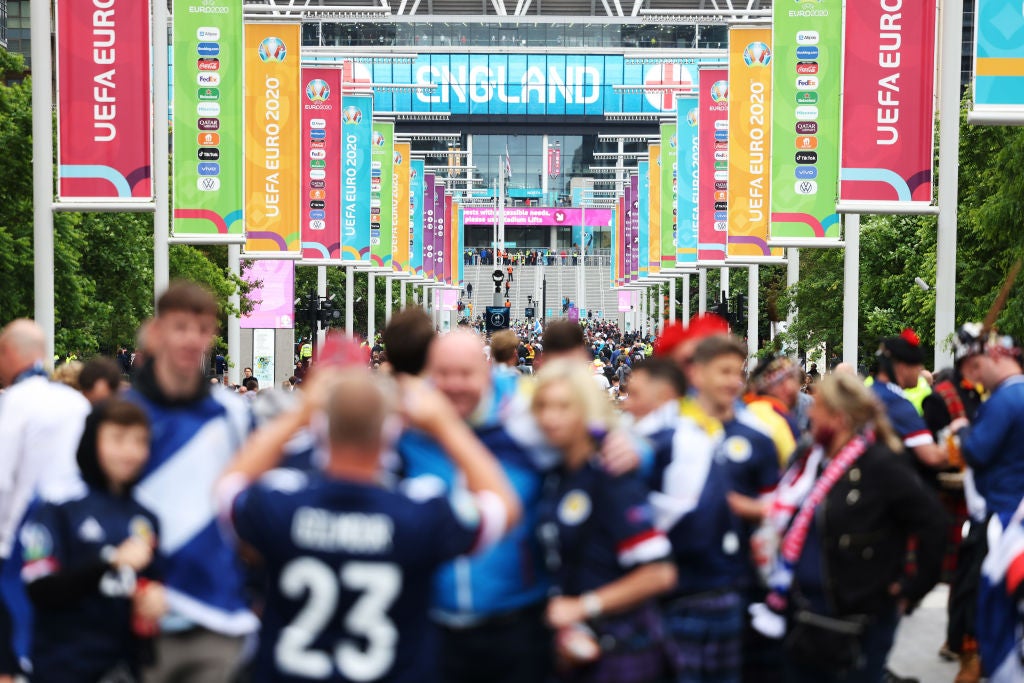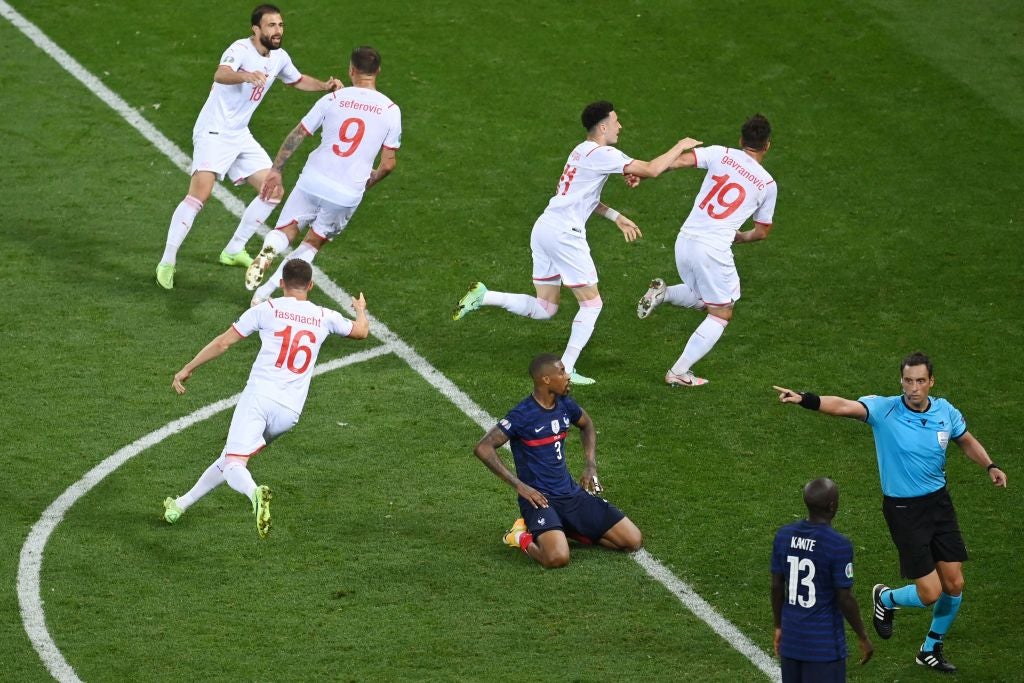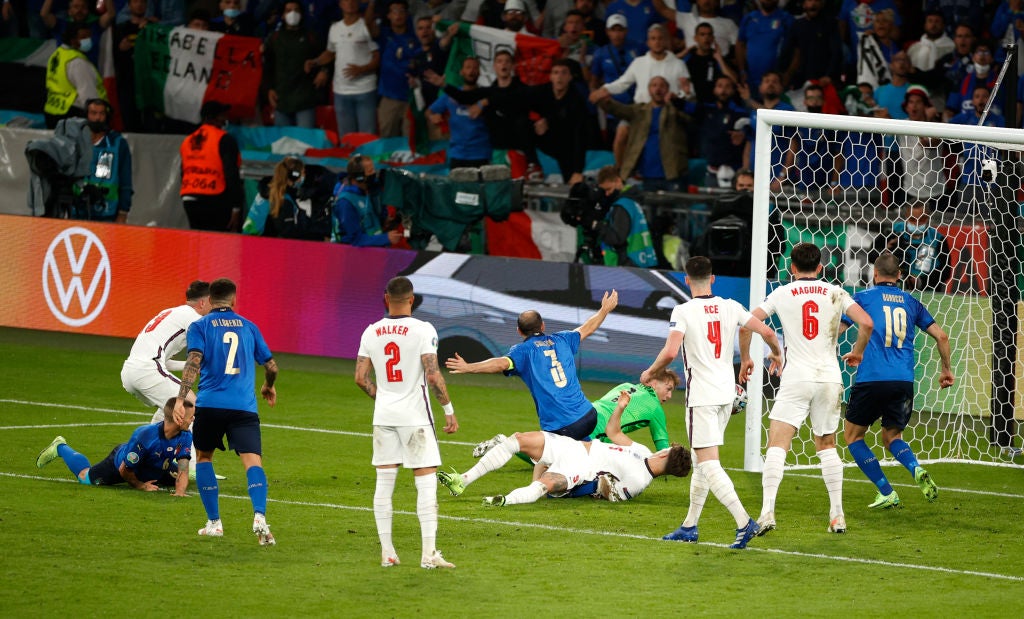Euro 2020 legacy reminds us of football’s purest motives and its capacity to consume attention
A month-long festival of enjoyment and release as much as of football itself

Your support helps us to tell the story
From reproductive rights to climate change to Big Tech, The Independent is on the ground when the story is developing. Whether it's investigating the financials of Elon Musk's pro-Trump PAC or producing our latest documentary, 'The A Word', which shines a light on the American women fighting for reproductive rights, we know how important it is to parse out the facts from the messaging.
At such a critical moment in US history, we need reporters on the ground. Your donation allows us to keep sending journalists to speak to both sides of the story.
The Independent is trusted by Americans across the entire political spectrum. And unlike many other quality news outlets, we choose not to lock Americans out of our reporting and analysis with paywalls. We believe quality journalism should be available to everyone, paid for by those who can afford it.
Your support makes all the difference.In the first 15 minutes of the Euro 2020 final, Roberto Mancini urgently beckoned Federico Chiesa and Nicolo Barella over. The Italian manager felt they weren’t doing enough to help out Giovanni Di Lorenzo out wide, and it was having a ruinous effect on his team. That was all the more pronounced since Leonardo Spinazzola’s injury ensured Italy required a reshuffle, and that the tactical balance was more precarious. There was a real danger that England would overwhelm them. That didn’t happen, largely because Mancini leaned on the qualities that had taken Italy so far.
That was the connection with the players, his conviction, but also a willingness to coach his way out of problems.
Even in the early stages of this tournament, many people who know Mancini well were saying this was the greatest feat of his managerial career. That was because of the purity of the achievements.
At previous jobs, he has been backed by big money, and could solve most problems with a purchase. International football demands something different, something more creative.
It was one more reason why the tournament was so refreshing and invigorating. It had a purity beyond the club game.
Before Euro 2020 started, there were a lot of debates about the time and place, given it was coming amid a Covid crisis after a year’s delay and with this ludicrous spread of host cities.
It ended up being at precisely the right time and place in terms of the history of the game.
After a year when fans had been locked out of stadiums, that culminated in a cabal of elite clubs trying to lock everyone else out of the top level, this was vivid colour over so much grey. It reminded us, in genuinely pure ways, why we love the game.
There were so few of the external influences of the club game, no oligarchs or state ownership. There was only national representation, and players doing it for old-fashioned motivations like honour and glory.
So much for the diminished status of international football.
Euro 2020 reminded us how there is nothing in sport like an international tournament. It demands and consumes attention like nothing else.
It becomes the only show in town, the only show that matters.
Euro 2020 wasn’t just a good tournament for modern international football, though, but a great tournament in the history of international football.
It had everything that makes a competition special.

There were a series of great games, including seven that saw both teams scoring twice, culminating in maybe the most dramatic day of international football ever seen. The evening of 28 June 2021 saw Spain beat Croatia 5-3 and Switzerland sensationally eliminate France after a two-goal comeback in a 3-3 draw. That ensured goals as spectacular as Karim Benzema’s and Paul Pogba’s were little more than mere details on the day - if admittedly delicious ones.
The tournament didn’t just have a series of brilliant goals, mind, but a glorious variety to them. Every kind of taste was catered for, from Patrik Schick’s long-range shot against Scotland to Italy’s team move, Cristiano Ronaldo’s counter and Benzema’s inspired touch.
All of this was amplified by what really makes a tournament: the storylines, that guarantee narrative climaxes and truly classic moments. Euro 2020 could rival even Italia ‘90 or the 1986 World Cup for this.
Most celebrated was Denmark’s response to the Christian Eriksen story, but there was also North Macedonia’s debut, the Alvaro Morata psychodrama, Spain’s existential journey, the premature eliminations of all of France, Germany, Portugal and Belgium, Scotland’s pain, England’s eventual anguish and Italy’s ultimate redemption.
This was another way Euro 2020 was so pure.
It was an attacking tournament, that inherently favoured adventure. The games and goals show that better than anything, but so do the numbers. At 2.78 goals per game, Euro 2020 was the highest-scoring European Championship since it became a proper competition, Leonardo Bonucci’s equaliser in the final seeing it edge ahead of Euro 2000 (2.74) and Euro 84 (2.73).
It was strides ahead of the miserly Euro 2016, which was 2.12.
That may well be the greatest tactical lesson of the competition, and perhaps its true legacy. Euro 2020 may signal a shift in international football.

The dreariness of its immediate predecessor pointed to a decline in the level. International managers couldn’t hope to match the integration of the club game, so instead sought to just create a solid base and go from there. It was what Gareth Southgate’s studies of 2016 and 2018 emphasised as Portugal and France won those tournaments, and what the England manager tried to model his own team on.
The issue was that teams like Italy and Spain showed another way was possible. Rather than just imposing a system to fit on top of the players, they worked from within to enhance their abilities. It made their teams more expansive, and ensured they had a higher level.
This was showcased in the showpiece occasion, despite Italy losing their two best-performing players in Spinazzola and Chiesa. They kept going.
Mancini just got creative to keep his team creative. It may well lead to an evolution in talent development, too, as a greater number of “positionless” players are coached. That's one way you get around the restrictions of international football, where you can't just solve problems with purchases. It could be another legacy of this tournament and its champions. It shouldn't escape attention, either, that it was another wealthy western European nation that won a tournament after industrialising youth production. That is a distinctive trend, and one area where there are some parallels with the finance-dictated club game. Italy at the least rose to the top by playing rousing football.
It will hopefully prove best practice in international football over the long term, because it's just better football to watch. The whole tournament was so absorbing and engaging.

This isn’t to say it was perfect – certainly not in structure.
Uefa already acknowledge that the third-place complications are a problem in how they skew competitiveness – despite the admitted drama of Group F – and they hate the multi-country format that was inherited from Michel Platini’s regime. The expectations are that the Euros will go to 32 teams in 2028, and that it will never be across multiple cities again.
Uefa also have some questions of their own to answer, not least as regards the political mess with Hungary on the rainbow banner and the general attitude to problematic governments such as Azerbaijan and Russia. There was then the chaos of the final at Wembley.
The authorities are hugely fortunate that the final didn’t involve much more serious incidents, but it is still a huge controversy that demands action.
The absence of anything more grave at least ensures the problems with the occasion don’t sully what was an otherwise superb tournament – and maybe the best since Euro 2000.
Even the refereeing and use of VAR was good. It wasn’t even sullied by tedious debates about that.
Euro 2020, for all its structural problems, just had a rare purity to the football itself.
Join our commenting forum
Join thought-provoking conversations, follow other Independent readers and see their replies
Comments